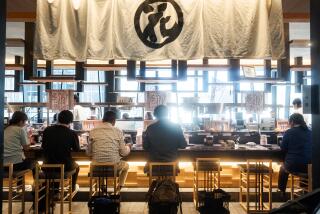The Revenge of the <i> Ronin</i>
- Share via
“General MacArthur’s occupation staff made thousands of changes in Japan after the war, but one of the most intriguing was banning performances of Chushingura, the great Kabuki play.
“Known in English as The Tale of the 47 Ronin, this work is adapted from an episode in early eighteenth-century history in which a certain Lord Asano plotted the murder of another nobleman, Lord Kira. Asano’s attack on Kira failed; he succeeded only in wounding him. When the shogun learned of Asano’s incredible breach of feudal ethics, he ordered Asano to commit seppuku (ritual suicide).
“The suicide of Asano meant that his loyal samurai retainers became masterless, wandering ronin. For years they plotted revenge. In a daring mission they finally burst into Kira’s house on a snowy winter night and murdered him. Impressed with the unswerving loyalty the ronin had shown to their master by fulfilling his wish to murder Kira, the shogun allowed the forty-seven murderers to die honorably by committing seppuku as well.
“The ronin became instant folk heroes. It wasn’t long before the drama was written down, immortalizing them forever. The themes of loyalty and revenge that underlie the story have turned it into one of the central shared myths of Japanese culture. After World War II, ‘the Allies did not want the Japanese to entertain the idea of vengeance for their total defeat,’ according to one Japanese commentator (Kimitada Miwa in Japan Times, July 12, 1987). And so the evocative force of Chushingura was banished from the stage.
“In today’s Kabuki repertoires, Chushingura is back. It is also celebrated in puppet theaters, comic books, movies, and ballets. ‘One just cannot avoid Chushingura, ‘ Ian Buruma has written. ‘Rarely, if ever, has one story captured the imagination of an entire nation to this degree.’
“As theater, Chushingura is a rich work, layered with meaning and implication. But at its heart it is a story about the virtue to be demonstrated by fulfilling a master’s interrupted mission, regardless of how ignoble the mission itself might have been to begin with. It is, in short, about the glory to be gained in seeking and obtaining revenge.
“In a country where Chushingura is the quintessential cultural work, the idea of Japan’s imperial destiny cannot be assumed to have vanished simply because the war was lost. A great and proud society that endured not only the humiliation of military defeat and foreign occupation four decades ago, but continues in 1988 to be forced to listen to American admonishments as if the United States still occupied Japan, will not go on practicing the alien method of ‘turning the other cheek’ forever.”
From “Yen! Japan’s New Financial Empire and Its Threat to America.”
More to Read
The biggest entertainment stories
Get our big stories about Hollywood, film, television, music, arts, culture and more right in your inbox as soon as they publish.
You may occasionally receive promotional content from the Los Angeles Times.








